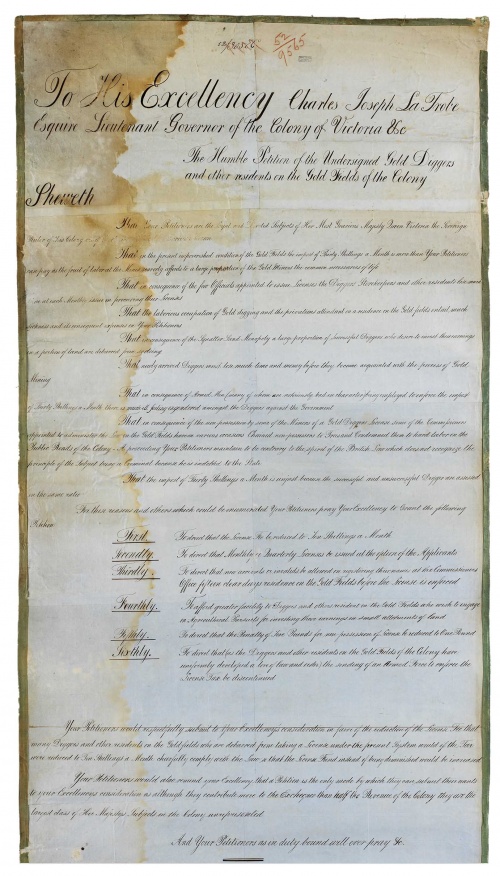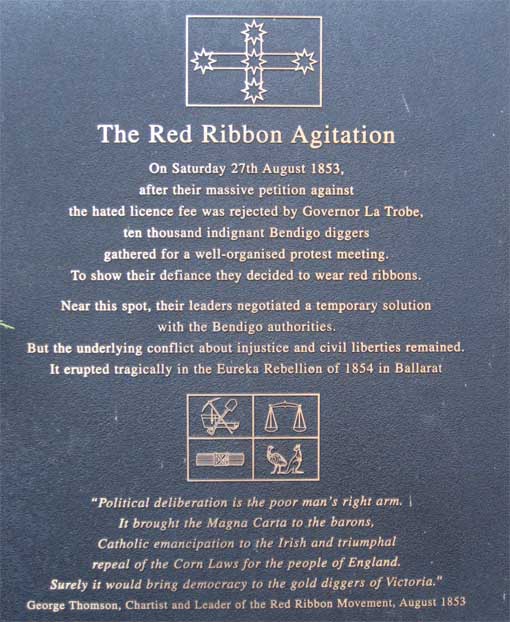W. Froomes

That the impost of Thirty Shillings a Month is unjust because the successful and unsuccessful Digger are assessed in the same ratio
For these reasons and others which could be enumerated Your Petitioners pray Your Excellency to Grant the following Petition
* First. To direct that the Licence Fee be reduced to Ten Shillings a Month
* Secondly To direct that Monthly or Quarterly Licenses be issued at the option of the Applicants
* Thirdly To direct that new arrivals or invalids be allowed on registering their names at the Commissioners Office fifteen clear days residence on the Gold Fields before the License be enforced
* Fourthly To afford greater facility to Diggers and others resident on the Gold Fields who wish to engage in Agricultural Pursuits for investing their earnings in small allotments of land
* Fifthly To direct that the Penalty of Five Pounds for non-possession of License be reduced to One Pound
* Sixthly To direct that (as the Diggers and other residents on the Gold Fields of the Colony have uniformly developed a love of law and order) the sending of an Armed Force to enforce the License Tax be discontinued.
Your Petitioners would respectfully submit to Your Excellency's consideration in favour of the reduction of the License Fee that many Diggers and other residents on the Gold-fields who are debarred from taking a License under the present System would if the Tax were reduced to Ten Shillings a Month cheerfully comply with the Law so that the License Fund instead of being diminished would be increased
Your Petitioners would also remind your Excellency that a Petition is the only mode by which they can submit their wants to your Excellency's consideration as although they contribute more to the Exchequer that half the Revenue of the Colony they are the largest class of Her Majesty's Subjects in the Colony unrepresented
And your Petitioners as in duty bound will ever pray etc.
Contents
Background
Goldfields Involvement, 1853-1854
Signed the 1853 Bendigo Goldfields Petition. Agitation of the Victorian goldfields started with the Forest Creek Monster Meeting in 1851, but what became known as the Red Ribbon Movement was centred around the Bendigo goldfields in 1853. The Anti-Gold License Association was formed at Bendigo in June 1853, led by George Thomson, Dr D.G. Jones and 'Captain' Edward Browne. The association focused its attention on the 30 shillings monthly licence fee miners were required to pay to the government. They drew up a petition outlining digger grievances and called for a reduced licence fee, improved law and order, the right to vote and the right to buy land. The petition was signed by diggers at Bendigo, Ballarat, Castlemaine, McIvor (Heathcote), Mount Alexander (Harcourt) and other diggings. The 13 metre long petition was presented to Lieutenant-Governor Charles La Trobe in Melbourne on the 01 August 1853, but their call for a reduction in monthly licence fees and land reform for diggers was rejected. The diggers dissatisfaction erupted into the Red Ribbon Rebellion where agitators wore red ribbons on their hats symbolising their defiance of the law and prohibitive licence fees.
Post 1854 Experiences
Notes
- RETURN OF MR W. FROOMES.
- Last evening Mr W. Froomes, whose name in Castlemaine is as familiar in our mouths as household words, returned to Castlemaine from England, whither he had gone in the hope of securing the restoration of his failing sight. During his absence of fourteen months his friends have anxiously watched the arrival of each succeeding mail trusting to hear that his mission had been successful. It having become known that he was a passenger in the Suffolk, aud at the last moment that he would arrive by the 10 20 p.m. train of last evening, the leading inhabitants of the borough determined to meet him at the Railway Station and give him a hearty welcome back to the town with which he has been so long and honorably connected. Accordingly, the Mayor and Borough Council, wiih large number of friends, assembled on the platform, and greeted him on alighting with three hearty and prolonged cheers. Mr Froomes was then conducted to the Impe rial Hotel, where all who had not done so at the station had an opportunity of shaking him by the hand, and expressing the gratification they felt in bis return to them. After a few minutes conversation, the Mayor of Castiemaine pro posed the health of Mr Froomes. He said that 14 months ago many of the faces he saw around him had gathered for the purpose of expressing the regret so generally felt at Mr Froomes' departure. They had now met to give him a cor dial welcome on his return. Many more would have been present, but it was thought that per haps Mrs Froomes and the members of his family would be with him, and that on the follow ing day it would be better to give him that demonstration of good will he was so worthy of. He (the Mayor) felt that no words of his could increase the high sense of esteem in which Mr Froomes was held in Castlemaine. He would, therefore, content himself with proposing his health, and heartily welcoming him back. After the toast had been drank iu the most cordial manner, Mr Froomes said that since he left Castlemaine, during the voyages he had made, the parting from his old friends had often passed before his mind. The circumstances at tending that leaving he was able to see. He had no idea such an enthusiastic welcome would have been accorded him, and that so large a number would have taken part in it. He could assure them that Castlemaine had never been forgotten by him. It was never ©ut of his mind. He felt highly flattered when he went away, he felt that he did not leave an enemy behind; and now, when he returned, they gave him a heartier welcome than ever. Though he had not suc ceeded in the main object of his mission to Eng land, he was glad to say he was in excellent health. Those amongst them who were working too hard he would advise to allow themselves relaxation. The most eminent occulists in Eng land whom he had consulted had told him that hard work, more than the climate, had conduced to the disease from which he suffered. He cor-dially thanked them from hia very heart for their kind welcome. Mr Froomes added : I cannot tell how you knew how I was coming up. I can't think bow you found it out— (laughter). I really thank you. Hearty cheers followed the short speech. Mr Froomes evidently labored under the intensity of his feelings, and there was not one around him who did not sympathise in the great loss be had endured. The health of the Mayor was then proposed by Mr Froomes, aud properly responded to, after which Mr H. N. L. Kentish, Clerk of Petty Sessions, said that it had been the inten tion ot the whole magisterial beuch, of which Mr Froomes was a member, to receive him on his arrival had the time been known, and that they would yet give him that cordial welcome they desired to do at his own convenience. The company then separated. Cr Christie states that Mr Froomes would be at his house to-day, and that any friends would be received with pleasure. A more hearty and feeling ex pression of respect is seldom accorded to any more than that awarded to Mr Froomes last evening, and to that expression we would in all sincerity add our own . Very expensive Breaches. — Breaches of promise. Wanted— a feather from the dovetail of a carpenter. Cunning,— The greatest cunning is to have none at all.[1]
See also
Ballarat Reform League Inc. Monuments Project
Further Reading
References
- ↑ Mount Alexander Mail, 18 september 1866.
External links
If you can assist with information on this person, or a related image, please email eurekapedia@yahoo.com.au
To CITE this page click Cite This Page on the link to the left of this page.
